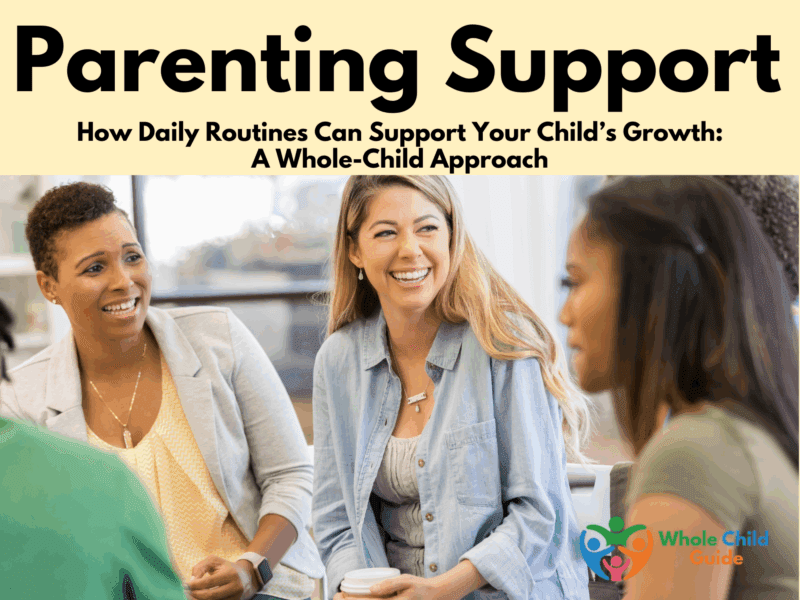
In this blog post, we want to pull together a massive resource list of Parenting Support That Starts at Home. You’ll find 10 blog posts below that each have specific strategies related to different aspects of development, and simple routines that can be done within the day to promote development. Each blog post has a free printable handout with 10 everyday routines that help your child grow. we wanted to put these resources all in one place so you can easily find the areas of development that you need to target.
Parenting doesn’t come with a manual, but it does come with moments. Moments when you’re packing a lunch, tying a shoe, brushing teeth, or calming a tantrum.
These small, everyday routines? They’re not just part of your to-do list. They’re powerful opportunities for growth.
That’s why we created this 10-part blog series for families looking for simple, meaningful parenting support. Through everyday routines, you can nurture your child’s behavior, emotional regulation, motor development, communication, and more, right from home.
So if you are just getting started trying to find the best strategies to support your child, OR if you are already working with a therapist, this series is here to support you in understanding the why behind your child’s needs and the how of supporting them.
What Is Parenting Support?
When we talk about parenting support, we don’t mean having all the answers or doing things perfectly.
Parenting support means feeling confident in how you guide, respond to, and care for your child, even when things are hard.
It’s about knowing:
- What’s behind your child’s behaviors
- How to create calm and connection in your routines
- Which strategies are right for your child’s individual needs
Most importantly, it’s about not feeling alone in the process.
That’s why we focus on everyday routines, because when you know how to use what’s already in your day (like meals, bedtime, or dressing), you unlock the power of parenting with intention.
Parenting Support for Your Child’s Growth in 10 Areas of Development
Parents have a lot going on. Having a streamlined list of go-to strategies to support areas of need is key. Below you’ll find links to all 10 posts in this series, each one packed with practical tips, examples, and strategies to use at home.
1. Everyday Strategies for Behavior & Emotional Regulation
Read the full post on Everyday Strategies to Support Emotional Regulation.
Behavior is often the surface sign of a deeper need, like difficulty with transitions, emotions, or sensory regulation. In this post, we show how routines like playtime and bedtime can help your child feel safer and more in control, while building emotional awareness and coping skills.
2. Motor Skills (Fine + Gross Motor)
Read the full post on Everyday Strategies to Support Motor Skills Development.
Motor skills are critical for everything from handwriting to climbing the playground steps. This post offers simple strategies during mealtime, dressing, and bedtime that promote strength, coordination, and independence, all while building confidence and connection.
3. Sensory Processing
Read the full post on Everyday Strategies to Support Sensory Processing.
Explore how everyday routines like bathing, eating, and movement breaks can support your child’s sensory needs. There are many different sensory challenges that kids can experience whether they’re sensory-seeking, avoiding, or easily overwhelmed.
4. Language & Communication
Read the full post on Language and Communication Supports.
From snack time to story time, discover how to support your child’s communication skills, including vocabulary, understanding directions, and expressing needs through natural, playful interaction.
5. Social Skills & Play
Coming soon
Social development starts with shared play, turn-taking, and joint attention. This post shows how routines like family meals and sibling playtime can strengthen connection and cooperation.
6. Executive Function & Attention
Simple strategies built into transitions, morning routines, and cleanup time can help your child build focus, flexibility, and follow-through. Read more information here on supporting executive function skills here.
7. Feeding & Mealtimes
Coming soon
From picky eating to utensil use, mealtime is a goldmine for skill-building. Learn how to support oral-motor development, hand strength, and sensory regulation at the table.
8. Sleep & Routines
Sleep routines affect the whole day. This post explores calming strategies, bedtime patterns, and sensory-friendly practices that support rest and regulation.
9. Self-Care & Independence
Whether it’s brushing teeth or putting on socks, daily care routines and functional life skills help your child grow in motor skills, planning, and self-confidence.
10. Multisensory Learning & Academic Readiness
Whole child literacy development recognizes that learning to read is deeply connected to a child’s movement, sensory experiences, emotional regulation, and cognitive growth. That’s why multisensory learning strategies are so powerful!
Want All 10 Parenting Support Strategies in One Place?
When the full series is complete, we’ll also release a printable handout pack perfect for:
- Parents looking for simple, at-home guidance
- Therapists sharing resources with families
- Teachers and IEP teams supporting carryover at home
Stay tuned for the release of the full 10-page download in our Whole Child Guide shop.
The Whole Child Approach to Parenting Support
Your child’s development isn’t one-dimensional. That’s why our parenting support approach looks at the whole child, across motor, sensory, emotional, and communication needs.
Because growth in one area influences growth in another.
Your child isn’t behind, they’re becoming. And with routines that offer consistency, connection, and skill-building, you’re giving them the foundation they need to thrive.
And you’re doing an amazing job, one routine at a time!

